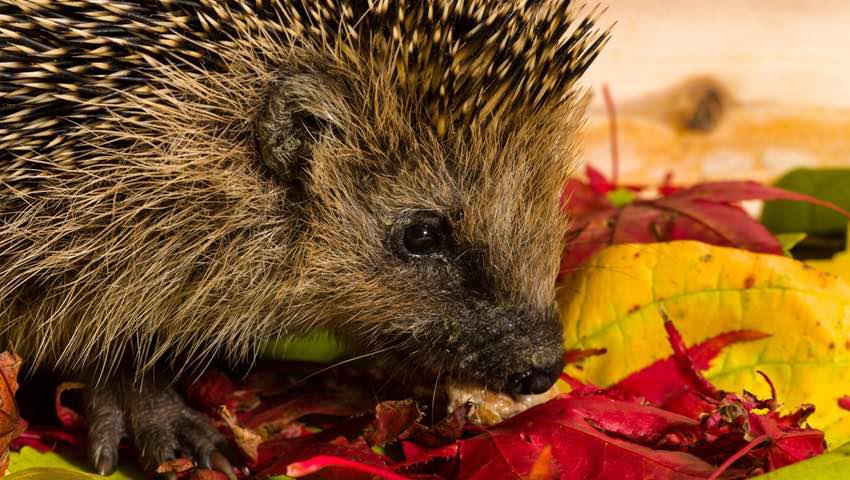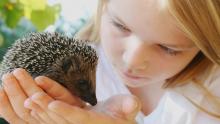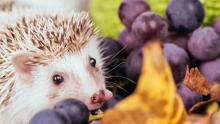Hedgehogs are classified as insectivores, but in reality they’re omnivores, opportunistic feeders who’ll eat whatever happens along. Their diet in captivity should be high in protein and low in fat. While there are commercial hedgehog chow products available, many of these are simply re-packaged food for rodents, or the leftovers from making cat and dog food. In either case, these aren’t appropriate diets for a hedgehog. Rodent diets rely too heavily on grains in their formula and won’t give a hedgehog enough protein, while the leftovers of other animals food will be lacking in nutrients and too high in fat.
The bulk of your hedgehog’s food should be comprised of hard kibble. The texture of the kibble will help the animal to keep its teeth clean and prevent dental issues. A healthy adult hedgehog will eat between ½ and 2 tablespoons of kibble a night depending on their age, activity level, and metabolism. You can adjust this amount to suit your individual hedgehog by keeping close watch of their weight and increasing or decreasing their food allowance accordingly. Make a mix for your hedgehog consisting of at least three different brands of kibble to make sure he’s getting a good range of nutritional input. Supplement this chow with occasional fruits and vegetables, cooked meats, and insects like mealworms and crickets.
In the wild, hedgehogs do most of their foraging at dawn and dusk, and these are the best times to offer them food in captivity. Replace the dry food with fresh offerings at around 7pm and leave it in the cage all night. Treats should be given when you want the hedgehog to come out to play. You can split their daily feeding into 2-3 smaller sessions if you’d prefer; this may be helpful in adjusting their schedule to be more awake during the daytime. Make sure the food you offer is at room temperature or warmer when you give it to your hedgehog; this tends to make hedgehogs want to eat it more.
Hedgehogs are lactose intolerant and shouldn’t be fed anything containing dairy. You should also avoid food that has artificial preservatives like BHA (butylated hydroxyanisole) and BHT (butylated hydroxytoluene) as these have been suspected of causing serious health problems, including certain cancers. Generally speaking, hedgehogs are resistant to most toxins, but there are a few foods that could be dangerous. Avoid avocados, grapes, and raisins—these foods have been linked to liver and renal failure. Nuts and seeds (frequent contributors to many small pet diets) are potential choking hazards and generally too fatty for a hedgehog; you should avoid feeding them. Anything a human would consider “junk food” is also bad. The high fat and sugar levels can contribute to obesity, and these foods often contain unhealthy preservatives.
There are a lot of good options for kibble at your local pet store that may or may not claim to be for hedgehogs. Always check the label on any food you buy and avoid anything with grain or corn as its primary ingredient, or anything that contains excessive amounts of preservatives, even if they’re not the specific ones noted above.
For owners of multiple pet species: you should not allow your hedgehog to share a larger pet’s dish, even if they eat exactly the same kind of food. This is partially to avoid cross-contamination of the food and prevent illness in all your animals, but it also prevents injury. Cats and dogs who are otherwise placid and accepting of the hedgehog might get protective of their food dishes, or could be so focused on eating that they step on or hit the hedgie without even meaning to (or noticing). It’s also impossible to determine how much food each individual animal is eating if they’re sharing dishes, meaning you won’t be able to monitor your hedgehog’s intake and could miss signs of an impending illness.
Dry cat or kitten kibble
Cat and kitten chows are the most reliable source of properly balanced nutrients. Look for a high-quality product that has meat as the primary ingredient. Meat or meat meal should also be the second ingredient listed. The kibble should ideally have 30% protein, though anything in the range of 24-35% is acceptable. Also look for a food that’s less than 15% fat and low in iron. Young hedgehogs (under 10 weeks of age) should be fed kitten chow—it’s softer, smaller, and easier for them to digest. After that, you can move them to a low-calorie formula for adult cats. The insects hedgehogs eat in the wild are very crunchy, and kibble delivers that crunch, making it appetizing for most hogs. Some will be picky about the shape or taste of their kibble once they’ve gotten used to a certain kind. If you’re trying out a new pet food, ask the store if they have a sample bag you can try so you don’t waste money on something your hedgehog will refuse to eat.
Dry dog food
Dog food meeting the same requirements (30% protein, 15% fat, low iron, and meat based) will fill your hedgehog’s nutritional needs. Buy the type made for small dogs—larger pieces of kibble may be difficult for a hedgehog to get its mouth around and chew. If you already have a large dog that eats food nutritionally suitable for your hedgehog, you can break the larger kibble into smaller chunks in the food processor and offer it to your hedgie in this easier to eat format.
Hedgehog chow
In the past, foods labeled as hedgehog diets were all pretty terrible for hedgehogs and owners were advised not to even consider these as options. In recent years, more high-quality hedgehog foods have started showing up in pet stores. Some good brands include Spike’s Delight, Exotic Nutrition’s Hedgehog Complete formula, 8in1 Ultra Hedgehog mix, and Sunseed hedgehog food. Though this isn’t a complete list, you should check the label of any other brand of hedgehog chow to make sure the first two ingredients are meat or meat meal and that it contains no seeds, nuts, or raisins.
Wet dog and cat food
Canned, wet dog and cat foods should only be given to hedgehogs as treats. Make sure they’re meat or poultry based and limit the amount to one teaspoon a day. Canned foods will often alter the consistency of the hedgehog’s waste; it may be moist or slimy, or have a stronger odor than usual.
Live food
As insectivores in the wild, hedgehogs will appreciate the inclusion of live food in their diet. This should be a supplement to dry kibble—a hedgehog in captivity will get too much fat and not enough other vitamins subsisting exclusively on live food. You can give them 3-5 mealworms in a day, 1-2 crickets, or a single waxworm. Insects should be gut-loaded for at least 24 hours before feeding them to your hedgehog (if you’re not familiar with this term, gut-loading is a process by which an insect’s nutritional value is enhanced by feeding them high-quality food).
Mealworms often come in a gut-load mix of flour and sawdust and can be left in that container. These little worms are the larval stage of the mealworm beetle. If left in a room-temperature environment, the mealworms will pupate into their adult form, a medium-sized black beetle that can also be fed to the hedgehog, or left in the container to lay eggs and form a self-sustaining colony. If you’d rather not deal with beetles, you can prevent pupation by keeping the mealworms in the fridge. Don’t feed freeze dried mealworms to your hedgehog—these have been implicated in instances of impacted bowels.
Crickets should be kept in a plastic container with a tight-sealing lid. You can find cricket gut-load formula in the reptile section of the pet store. Provide the crickets with a slice of a hard fruit or vegetable for water (like a melon, potato, apple, or pear). Crickets are more difficult to breed, and considering how few you’ll need for your hedgehog, you’ll likely be best served by buying only as much as you need for a few feedings from your local pet store.
Fruits and vegetables
Fruits and vegetables should be considered treats for a hedgehog. Give them only small amounts per day (less than a teaspoon). Avoid avocado and grapes, as mentioned above; otherwise, all fruits and vegetables are fair game. Food enjoyed by most hedgehogs include peas, corn, yams, apples, melon, and bananas.
Cooked meats
Some other human food can be an appropriate treat for a hedgie. Poultry and hamburger are popular hedgehog treats. Make sure the meat is unseasoned and avoid pre-packaged lunch meats or other items containing lots of salt and preservatives. As with the other treats above, offer them no more than 1 teaspoon in any given day.
Supplements
If your hedgehog has dry skin issues you can add a few drops of an omega fatty acid or some flax seed into their food mix. Most hedgehogs will not need other nutritional supplements. You should only give them vitamin mixes if it’s recommended by your vet; due to the vitamins and minerals already present in their food, hedgehogs who are given generic small animal multi vitamins could receive too much of certain things, some of which can be accumulated in the blood to toxic levels.


